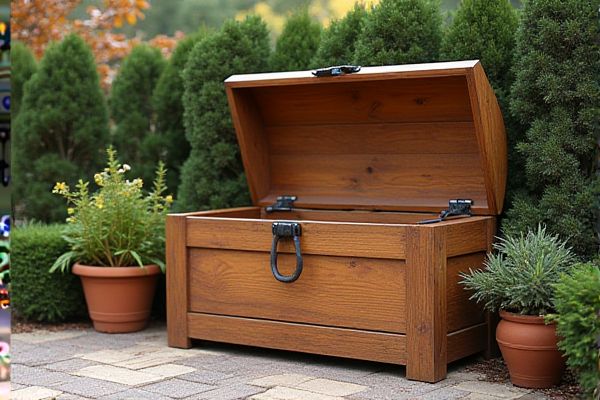
A deck box offers compact storage designed for outdoor furniture cushions and smaller items, while an outdoor chest typically provides larger capacity suitable for bulky garden tools and recreational gear. Explore the rest of the article to determine which storage solution best fits Your outdoor organization needs.
Table of Comparison
| Feature | Deck Box | Outdoor Chest |
|---|---|---|
| Primary Use | Storing deck cushions and small outdoor items | Storing bulkier outdoor equipment and tools |
| Material | Plastic, resin, or wood | Wood, metal, or heavy-duty plastic |
| Size | Compact to medium | Generally larger and more spacious |
| Weather Resistance | Moderate - often water-resistant | High - designed to withstand harsh outdoor conditions |
| Mobility | Lightweight, easy to move | Heavier, less portable |
| Locking Mechanism | Optional locks | Often includes lockable features for security |
| Price Range | Affordable to mid-range | Mid-range to expensive |
Understanding Deck Boxes and Outdoor Chests
Deck boxes and outdoor chests serve as versatile storage solutions for patios, gardens, and decks, designed to protect items from weather elements while maximizing outdoor space. Deck boxes typically feature low-profile designs with flat tops that double as seating or tables, ideal for storing cushions, gardening tools, or pool accessories, while outdoor chests offer larger capacities with sturdy construction suited for bulky items like patio furniture covers or outdoor toys. Both options prioritize weather resistance and durability, often crafted from materials such as resin, wood, or metal, ensuring long-lasting protection and organization in outdoor environments.
Key Differences Between Deck Boxes and Outdoor Chests
Deck boxes typically offer lightweight, portable storage solutions designed for outdoor cushions and small garden tools, while outdoor chests provide larger, more robust storage with enhanced weather resistance suitable for bulkier items like patio furniture or sports equipment. Material composition varies, with deck boxes often made from resin or plastic, offering easy maintenance, whereas outdoor chests frequently feature metal or treated wood for increased durability. Your choice depends on storage capacity needs, portability preferences, and the level of protection required against outdoor elements.
Materials Used: Durability and Weather Resistance
Deck boxes are typically constructed from durable resin, plastic, or treated wood, offering strong weather resistance and protection against moisture, UV rays, and temperature fluctuations. Outdoor chests often feature heavier materials such as solid cedar, metal, or composite wood, providing enhanced durability and resistance to harsh outdoor conditions like rain, snow, and sun exposure. Selecting between a deck box and an outdoor chest depends on desired material strength, weatherproofing needs, and maintenance preferences for long-term outdoor storage.
Storage Capacity and Organization
Deck boxes typically offer moderate storage capacity ranging from 30 to 100 gallons, designed to store outdoor cushions, gardening tools, and pool accessories with compartmentalized interiors for organized access. Outdoor chests generally provide larger capacity, often exceeding 100 gallons, and feature spacious interiors that accommodate bulkier items like patio furniture covers and sports equipment, though they may lack specialized compartments. Choosing between the two depends on the volume and variety of items needing storage and the importance of internal organization for easy retrieval.
Design and Aesthetic Appeal
Deck boxes typically feature sleek, compact designs with modern finishes that blend seamlessly into patio or deck environments, enhancing your outdoor aesthetic without overpowering the space. Outdoor chests often have a more robust, traditional look with wood or heavy-duty plastic construction, providing a rustic or classic charm ideal for garden or yard settings. Your choice depends on whether you prefer a streamlined, contemporary style or a sturdy, vintage appeal for your outdoor storage needs.
Security Features and Lockability
Deck boxes often feature integrated lockable lids or pre-drilled holes for padlocks, providing basic security ideal for protecting your outdoor items from theft. Outdoor chests typically offer more robust lockability options with heavy-duty latch systems and reinforced hinges, enhancing protection against tampering and harsh weather conditions. Choosing between the two depends on the level of security you require and the value of the items you intend to store.
Ease of Access and Use
Deck boxes offer superior ease of access with their hinged lids that open upwards, allowing quick retrieval of items without needing to remove the entire top. Outdoor chests often have larger storage volumes but may require more effort to open and reach items at the bottom, especially if the design includes a front-facing door or heavier lid. For frequent use and convenience, deck boxes provide a more user-friendly experience with straightforward, accessible storage solutions.
Maintenance and Longevity
Deck boxes typically require regular cleaning and occasional sealing or waterproofing to maintain their durability, especially if made from wood or plastic composites. Outdoor chests often boast more robust weather-resistant materials such as metal or heavy-duty resin, which reduce maintenance needs and extend lifespan in harsh outdoor conditions. Choosing a product with UV-resistant coatings and rust-proof hardware significantly enhances longevity for both storage options.
Price Comparison and Value for Money
Deck boxes generally offer a more budget-friendly option compared to outdoor chests, making them ideal for those seeking functional storage without a high upfront cost. Outdoor chests often provide greater durability and larger storage capacity, which can translate to better long-term value despite a higher initial price. Your choice depends on balancing immediate affordability with the added benefits of sturdier construction and extended use.
Which is Right for Your Outdoor Space?
Choosing between a deck box and an outdoor chest depends on your storage needs and available space. A deck box typically offers a compact design ideal for seating and storing smaller items like cushions and gardening tools, while an outdoor chest provides larger capacity suited for bulkier items such as patio furniture covers or sports equipment. Assess your outdoor area and the type of items you need to store to determine which option best complements Your outdoor space's functionality and style.
 homyna.com
homyna.com